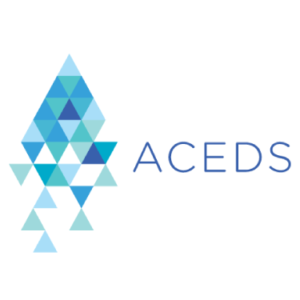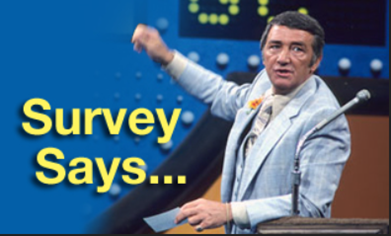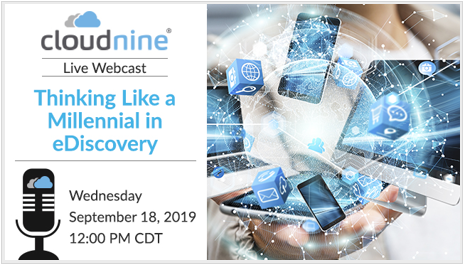Mary Mack and Kaylee Walstad acquire the EDRM from Duke Law: eDiscovery Breaking News
It’s a rare two-post day for us at eDiscovery Daily, but this news is worth it. Mary Mack and Kaylee Walstad, the former executive director and former vice president of client engagement, respectively, of The Association of Certified E-Discovery Specialists (ACEDS) today announced that they have acquired the Electronic Discovery Reference Model (EDRM) from the Bolch Judicial Institute at Duke Law School.
Here is the text of the press release issued earlier this morning. Also, Zach Warren of Legaltech News covered the story here.
Minneapolis, MN – October 18, 2019 – Mary Mack (CISSP, CEDS, CIAM) and Kaylee Walstad (CEDS, CIMP), the former executive director and former vice president of client engagement, respectively, of The Association of Certified E-Discovery Specialists (ACEDS) today announced that they have acquired the Electronic Discovery Reference Model (EDRM) from the Bolch Judicial Institute at Duke Law School.
The EDRM is the leading global framework organization for the e-discovery community. The organization developed the ubiquitous EDRM model to provide a global language for understanding the intricate steps in the e-discovery process and to communicate them effectively. George Socha and Tom Gelbmann founded the EDRM in 2005, and Duke Law acquired it in 2016. The terms of the acquisition transaction are not being disclosed.
For the past four years, Mack and Walstad led ACEDS, the leading global provider of ediscovery certification and education, stewarding the growth of the association, its certification program, and its chapters to international status and recognition. In their new roles, Mack will serve as the chief executive officer and chief legal technologist, and Walstad will serve as the chief strategy officer for the EDRM. The Bolch Judicial Institute will remain involved in the work of the EDRM community as a valued partner.
“Mary and Kaylee bring a deep understanding of the challenges and opportunities facing the e-discovery industry, as well as strong connections to e-discovery and legal leaders and innovators,” said David Levi, Levi family professor of law and judicial studies, and director of the Bolch Judicial Institute. “Their collective vision and creativity will guide the EDRM into a new and exciting chapter.”
“Kaylee and I are so excited about the prospect of building on the amazing work that George, Tom and the Duke team, advisory council, project leads, sponsors and contributors have done, as well as the ability to shepherd the EDRM to its next evolution,” said Mack. “Partnering with David Levi and his fantastic team at the Bolch Judicial Institute, as well as George Socha and so many EDRM supporters is our dream opportunity. The EDRM is a place where our global community can get involved immediately and meaningfully. Kaylee and I are honored to have the opportunity to take the EDRM into the future and to collaborate with such outstanding people.”
“When Tom Gelbmann and I founded the EDRM in 2005, we sought to create a resource that would help folks to better understand e-discovery and its potential,” said George Socha. “I am thrilled that Mary and Kaylee will be taking the helm at the EDRM, guiding it and its community to the next level. I have worked with Mary and Kaylee for many years and eagerly look forward to working closely with them as they advance and expand the EDRM.”
“I am excited to learn that Mary and Kaylee, who together helped build ACEDS into a powerhouse institution that is respected across the globe, will be launching this new chapter that provides a new look and new home to EDRM,” said Mike Quartararo, the recently named president of ACEDS. “We have already had discussions about how ACEDS and EDRM will complement one another, building on a partnership that already exists, and delivering high-quality and meaningful content to the ACEDS membership and community.”
“Law and technology are, of course, key components of the Bolch Judicial Institute’s mission, and we will remain closely involved in the EDRM’s work,” said Levi. “We think that the EDRM’s future is very bright with Mary and Kaylee at the helm, and we intend to be a part of that future.”
The EDRM organization currently has nine active projects through which legal professionals, such as judges, attorneys, e-discovery experts, and technology and support providers, work together to create new resources and frameworks that serve as guides and touchstones for the rapidly shifting world of e-discovery. Mack and Walstad will quickly engage with the EDRM project leaders and teams, as well as the EDRM’s advisory council and partners, to collaboratively develop next steps and future plans for the EDRM’s global community.
So, we now not only know who has taken over ACEDS, but also what Mary and Kaylee will be doing next! Exciting news for the eDiscovery community and we at CloudNine look forward to working with Mary and Kaylee on exciting EDRM initiatives!
So, what do you think? How do you think this acquisition will impact EDRM? Please share any comments you might have or if you’d like to know more about a particular topic.
Sponsor: This blog is sponsored by CloudNine, which is a data and legal discovery technology company with proven expertise in simplifying and automating the discovery of data for audits, investigations, and litigation. Used by legal and business customers worldwide including more than 50 of the top 250 Am Law firms and many of the world’s leading corporations, CloudNine’s eDiscovery automation software and services help customers gain insight and intelligence on electronic data.
Disclaimer: The views represented herein are exclusively the views of the author, and do not necessarily represent the views held by CloudNine. eDiscovery Daily is made available by CloudNine solely for educational purposes to provide general information about general eDiscovery principles and not to provide specific legal advice applicable to any particular circumstance. eDiscovery Daily should not be used as a substitute for competent legal advice from a lawyer you have retained and who has agreed to represent you.














